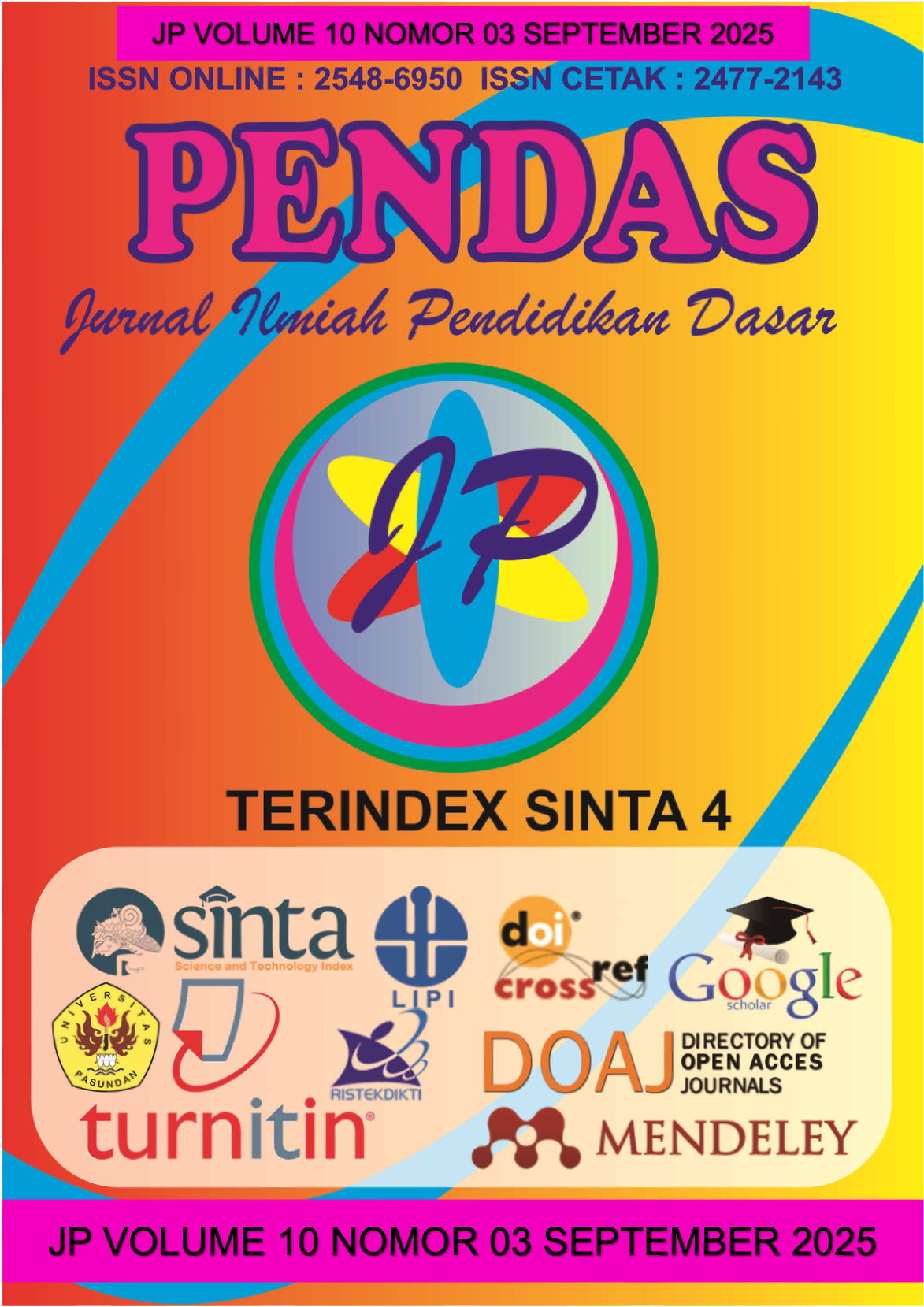STUDI LITERATUR: MODEL PEMBELAJARAN BRAIN BASED LEARNING PADA PELAJARAN PENDIDIKAN PANCASILA DI SEKOLAH DASAR
DOI:
https://doi.org/10.23969/jp.v10i03.29435Keywords:
Brain Based Learning, Pancasila Education, Elementary SchoolAbstract
Pancasila education in elementary schools plays a vital role in shaping the character of Indonesia's young generation. Its primary objective is to instill the moral, ethical, and social values of Pancasila, enabling students to become responsible and tolerant individuals. Students aged 7 to 12 are in the concrete operational stage, where they begin to think logically but struggle with abstract concepts. Therefore, engaging and interactive teaching methods are essential. The application of Brain Based Learning (BBL) serves as an effective solution to enhance student engagement by considering how the brain functions in learning. Methods such as discussions, role-playing, and hands-on experiences help students understand and internalize Pancasila values. However, challenges like students' lack of understanding and the influence of globalization need to be addressed. Thus, effective Pancasila education in elementary schools not only shapes students' character but also strengthens national identity.
Downloads
References
Adiansha, A. A., & Sani, K. (2021). Pengaruh Model Brain Based Learning dan Problem Based Learning terhadap Keterampilan Berpikir Kompleks Matematis ditinjau dari Kreativitas Siswa Sekolah Dasar di Kabupaten Bima. Jurnal Pendidikan MIPA, 11(1), 36-44.
Adiansha, M., & Sani, R. (2021). Penerapan Model Pembelajaran Brain Based Learning untuk Meningkatkan Hasil Belajar Siswa. Jurnal Pendidikan Dasar, 5(2), 123-135.
Brusilovsky, P., & Millán, E. (2007). User Modelling for Adaptive Hypermedia and Adaptive Educational Systems. In The Adaptive Web (pp. 3-53). Springer.
Creswell, J. W. (2014). Research Design: Qualitative, Quantitative, and Mixed Methods Approaches (4th ed.). Sage Publications.
Darmawan, D., & Suhartini, S. (2023). Neurosains dalam Pembelajaran Nilai-Nilai Pancasila. Jurnal Pendidikan Karakter, 14(1), 45-58.
Dimas, A. (2020). Innovative Teaching Methods: Brain-Based Learning in Action. Journal of Innovative Education, 7(2), 34-48.
Dwi, A. (2022). The Connection Between Brain Development and Learning Styles. Journal of Learning Styles, 8(1), 12-25.
Fauzi, A. (2023). Analisis Kesulitan Pembelajaran Pancasila di Sekolah Dasar. Pedagogia: Jurnal Pendidikan, 12(2), 112-127.
Gardner, H. (1983). Frames of Mind: The Theory of Multiple Intelligences. Basic Books.
Hamonangan, R. (2020). The Role of Technology in Brain-Based Learning. International Journal of Educational Technology, 15(3), 45-60.
Hidayati, N. (2023). Implementasi Pendidikan Pancasila di Sekolah Dasar. Jurnal Pendidikan Karakter, 14(1), 45-58.
Jensen, E. (2020). Brain-Based Learning: The New Paradigm of Teaching (4th ed.). Corwin Press.
Jensen, E. (2008). Brain-Based Learning: The New Science of Teaching and Training. Corwin Press.
Lave, J., & Wenger, E. (1991). Situated Learning: Legitimate Peripheral Participation. Cambridge University Press.
Moleong, L. J. (2018). Metodologi Penelitian Kualitatif (Revisi). PT Remaja Rosdakarya.
Prasetyo, A. (2022). Pendidikan Pancasila dan Karakter Bangsa. Jurnal Pendidikan dan Kebudayaan, 7(3), 201-210.
Piaget, J. (1970). The Science of Education and the Psychology of the Child. Orion Press.
Purnomo, E. (2022). Efektivitas Parsial Brain Based Learning pada Pendidikan Karakter. Jurnal Ilmiah Sekolah Dasar, 6(1), 89-101.
Rachmawati, D., Sari, N., & Hidayati, N. (2022). Integrasi Pendidikan Karakter dalam Pembelajaran Berbasis Otak. Jurnal Pendidikan Karakter, 10(1), 45-58.
Rachmawati, N. A. M., Nafiah, M., & Nurasiah, I. (2022). Projek Penguatan Profil Pelajar Pancasila dalam Implementasi Kurikulum Prototipe di Sekolah Penggerak Jenjang Sekolah Dasar. Jurnal Basicedu, 5(3), 1683-1688.
Rina, S. (2021). The Influence of Brain-Based Learning on Student Motivation. Journal of Student Motivation, 5(3), 45-60.
Santoso, B. (2022). Karakteristik Siswa Sekolah Dasar dan Implikasinya dalam Pembelajaran. Jurnal Pendidikan dan Pembelajaran, 15(1), 45-60.
Saputra, A., & Rahmat, H. (2022). The Effectiveness of Brain-Based Learning in Teaching Pancasila Values. Journal of Pancasila Education, 8(2), 78-90.
Sari, R. (2021). Peran Pendidikan Pancasila dalam Pembentukan Karakter Siswa. Jurnal Pendidikan Dasar, 10(2), 89-97.
Siti, R. (2022). The Effect of Brain-Based Learning on Learning Outcomes in Pancasila Education. Journal of Educational Research and Practice, 10(2), 34-50.
Sukardi, A. (2021). Motivasi Belajar Siswa di Sekolah Dasar. Jurnal Psikologi Pendidikan, 8(2), 75-85.
Supriatna, E. (2021). Meta-Analysis of Brain-Based Learning in Southeast Asia. International Journal of Instruction, 14(3), 567-582.
Tania, L. (2022). The Future of Education: Integrating Brain-Based Learning with Pancasila Values. Journal of Educational Futures, 11(3), 78-90.
Vygotsky, L. S. (1978). Mind in Society: The Development of Higher Psychological Processes. Harvard University Press.
Widodo, H. (2021). Pendidikan Pancasila Berbasis Neurosains. Repository Universitas Negeri Malang.
Yin, L. (2021). Challenges and Opportunities in Brain-Based Learning for Pancasila Education. Journal of Educational Challenges, 12(4), 34-50.
Downloads
Published
Issue
Section
License
Copyright (c) 2025 Pendas : Jurnal Ilmiah Pendidikan Dasar

This work is licensed under a Creative Commons Attribution 4.0 International License.



















